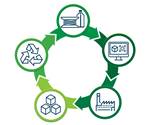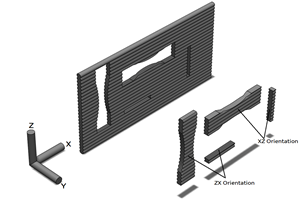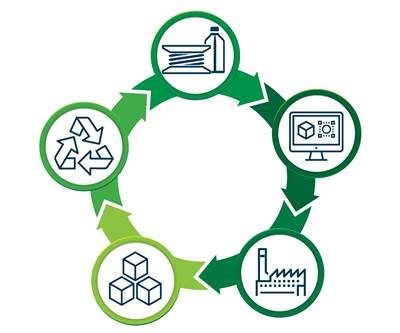Colorado Alliance Will Advance Sustainable Thermoplastics and Additive Manufacturing
Vartega, the Colorado Cleantech Industries Association, and a group of industry and academic partners have founded an Advanced Materials and Additive Manufacturing Infrastructure Development and Education (AMIDE) Alliance.
Vartega and the Colorado Cleantech Industries Association have announced the formation of the Advanced Materials and Additive Manufacturing Infrastructure Development and Education (AMIDE) Alliance. The alliance, which was formed by a group of industry and academic partners as the result of a $500,000 Advanced Industries Accelerator (AIA) Collaborative Infrastructure Grant award from the Colorado Office of Economic Development and International Trade, will close a significant gap in the materials supply chain in Colorado by providing critical resources for the development of thermoplastics for additive manufacturing.
The AIA grant funding will support the creation of at least three innovation centers in Colorado focused on the development and application of fiber-reinforced thermoplastics and additive manufacturing materials. The centers will house equipment critical to the maturation of new additive manufacturing technologies and materials as well as programs that train and educate new generations of professionals, students and technicians.
“This was an extremely competitive grant cycle, but the review committee and the Economic Development Commission recognized the value that Vartega, CCIA, and the other project partners could bring to the state through this investment in an advanced materials and additive manufacturing ecosystem,” says Katie Woslager, senior manager, Advanced Industries, State of Colorado Office of Economic Development and International Trade.
The founding partners of the alliance include Vartega, CCIA, Colorado State University, EWI and The 3D Printing Store. Additional support for the grant proposal and the AMIDE Alliance comes from the American Composites Manufacturers Association, Arkema, Autodesk, Colorado School of Mines, the Composite and Nanocomposite Advanced Manufacturing Center, Draper, Front Range Community College, The Institute for Advanced Composites Manufacturing Innovation, Johns Manville, Lulzbot, Michelman, Rocky Mountain SAMPE, StudioWest Concepts and Universal Plastics.
Support also comes from Colorado manufacturers AMP Industrial, the Crestridge Group, Oribi Manufacturing and Steelhead Composites, which already have new products in development using advanced materials and manufacturing methods, including 3D-printed and extruded carbon fiber thermoplastics. Alliance members will be represented by a seven-person governance board made up of industry and academic partners.
“There was so much great work happening in Colorado around the adoption and acceleration of 3D printing, but we kept running into the same problems sourcing and developing new materials and identifying local expertise for these applications,” says Vartega CEO Andrew Maxey. “As we recognized this gap in the supply chain and workforce, we were able to work with our customers and partners to put together a vision of what a vertically integrated supply chain would look like. We’re excited to be part of the newly formed AMIDE Alliance to close this gap and increase innovation in this growing and important area of manufacturing.”
Vartega produces recycled carbon fiber from scrap material generated in aerospace, automotive, wind energy and sporting goods manufacturing. They combine their recycled carbon fiber with thermoplastics to make custom materials for use in 3D printer filament and injection molding for applications such as sporting goods, consumer products and car parts. Through its participation in the AMIDE Alliance, Vartega will make capital equipment investments to increase the production of custom thermoplastic formulations in Colorado.
Shelly Curtiss, CCIA executive director, notes, “Advanced materials and additive manufacturing are impacting just about every industry right now. We see a huge opportunity to leverage these new developments throughout the cleantech sector for the benefit of our members who are focused on renewables, energy efficiency, clean water, oil and gas, mining and transportation.” CCIA will serve a critical role in overseeing the establishment of the AMIDE Alliance board and administrating the grant funds for the innovation centers.
The aim of the AMIDE Alliance is to create an ecosystem for materials development and testing through investment in equipment and resources. This ecosystem will enable accelerated development of advanced materials for additive manufacturing and training for the next generation of skilled workers in the new manufacturing economy. These goals will be accomplished through the creation of innovation centers in collaboration with Colorado State University, Colorado School of Mines and Vartega.
The Colorado State University center will be located at the Composite Materials, Manufacture and Structures Laboratory (CMMS), where a six-axis robotic system will be installed for direct manufacture of continuous fiber-reinforced thermoplastic composites. The Colorado School of Mines center will be located in the Interdisciplinary Advanced Manufacturing Teaching Lab. This center will house an HP Multi Jet Fusion 580 3D printer for evaluation and characterization of fiber-reinforced polymer powders being developed by project partners. The third innovation center will be located at an industry partner facility and will include extrusion equipment for the development of fiber-reinforced thermoplastics for 3D printing applications.
In addition to the innovation centers, EWI in Loveland, Colorado, will provide advanced nondestructive evaluation, modeling and inspection services to support the ongoing new materials development. Workforce development is also a critical objective of the AMIDE Alliance, and support for these efforts will be provided by Front Range Community College, Colorado School of Mines, IACMI and ACMA through the development of a curriculum focused on closing the skills gap for additive manufacturing and composites.
Related Content
Alquist 3D Looks Toward a Carbon-Sequestering Future with 3D Printed Infrastructure
The Colorado startup aims to reduce the carbon footprint of new buildings, homes and city infrastructure with robotic 3D printing and a specialized geopolymer material.
Read MoreCopper, New Metal Printing Processes, Upgrades Based on Software and More from Formnext 2023: AM Radio #46
Formnext 2023 showed that additive manufacturing may be maturing, but it is certainly not stagnant. In this episode, we dive into observations around technology enhancements, new processes and materials, robots, sustainability and more trends from the show.
Read MoreSustainable Furniture Company Model No. Maintains Product Focus with Switch from DIY to Industrial 3D Printers
The startup founded in 2018 has matured in its product offerings as well as its manufacturing equipment, moving from homegrown 3D printers to industrial large-format machines.
Read MoreEvaluating the Printability and Mechanical Properties of LFAM Regrind
A study conducted by SABIC and Local Motors identified potential for the reuse of scrap reinforced polymer from large-format additive manufacturing. As this method increases in popularity, sustainable practices for recycling excess materials is a burgeoning concern.
Read MoreRead Next
Additive Manufacturing Will Aid And Accelerate The Circular Economy
A circular economy links material, design, manufacturing, product and end-of-life in a continuous, sustainable loop. This special report illustrates the roles for 3D printing every step of the way.
Read More3D Printed Polymer EOAT Increases Safety of Cobots
Contract manufacturer Anubis 3D applies polymer 3D printing processes to manufacture cobot tooling that is lightweight, smooth and safer for human interaction.
Read MoreCrushable Lattices: The Lightweight Structures That Will Protect an Interplanetary Payload
NASA uses laser powder bed fusion plus chemical etching to create the lattice forms engineered to keep Mars rocks safe during a crash landing on Earth.
Read More




















